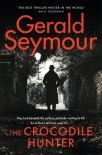The Crocodile Hunter by Gerald Seymour (english novels to improve english txt) 📗

- Author: Gerald Seymour
Book online «The Crocodile Hunter by Gerald Seymour (english novels to improve english txt) 📗». Author Gerald Seymour
He had been travelling almost a year. They had been on the move – so they had told him – half of that time. Cammy had come from a point on the Euphrates, where it marked the border between Syrian and Iraqi territory. They had started out from the Iranian city of Tabriz, far to the north and to the east of Tehran. They both had a goal.
He smoked and gazed out. They were a little beyond first light. It was common sense to travel at night. They were 500 miles from Bordeaux, and he had done the journey in three legs. They were attached to him, could have been chained to him, seemed terrified they would suddenly lose sight of him and he would be gone. It had started in a café down by the docks, across the Garonne, and his money was used up and he had no documentation. He had been in the café because it was warm, and he was chilled, hungry. The patron had been making noises about throwing him out. If a hand had been laid on him by the heavily built, middle-aged manager, if an attempt had been made to propel him to the door and chuck him into the street then he would probably have resisted: had Cammy resisted then there was a strong prospect that he would have chopped the heel of his right hand into the man’s neck and paralysed him, probably killed him. It was not difficult for him to take a life if he was minded to.
They had pushed through the door. They were Iranians. Two men, two women, two children. Migrants who had reached France and needed help in edging closer to what would have been a “jump off point”. When the café man had challenged him, the Iranians had been sitting at an adjacent table and the kids had been given the menu, and a wad of euros was on the table. He was challenged . . . Was he ordering coffee, alcohol, food? No response from Cammy. The café was not a tram-stop shelter he was told . . . He had spat back, not loud but distinct, in English, that the man could “Go fuck yourself”. One of the Iranian men had spoken up. Cammy was to be included on their tab . . . Why? He had spoken in English. Did he drive? He could drive: could have driven a motorcycle, a car, a pick-up, an armoured personnel carrier, could have driven a tractor around which half-inch-thick steel plating had been welded. Yes, he could drive.
He noted the wind and sensed that the children shivered, and fear might be competing with the cold. They had taken a chance. It would have been something to do with his appearance: rugged, uncomplicated, ravaged, and something to do with the clarity of his eyes and the fact he did not blink and did not look away but held their gaze and stared right back into their own eyes, and something to do with the slow and steady and winning smile. The proposition had been made. Would he take them north? He had said yes, that was where he, too, was headed.
One of the men had said, “But we have to go across by subterfuge, not through any legal route, and . . .”
Cammy had said softly, no drama, “And me.”
Puzzlement. “But you are going back to your own country. Why do you need to go as we do?”
A little shrug, not necessary for them to know the answer. He was told they had a contact name in the north, on the coast, a man who would facilitate a crossing if he were paid sufficiently. Cammy had eaten with them. He had told them that they should be on the street corner in 25 minutes, had left them. Had gone to a parking lot, had done a hot wire, had come back with a van that had sliding doors and two rows of seats behind the driver. Had driven them away from Bordeaux and had taken the minor roads where any vehicle recognition plate system was unlikely.
The wind was bad. And the wind’s force mattered.
For that moment, Cammy ignored his Iranian fellow travellers. They were useful to him. They had money, were headed in the same direction. But he denied them affection or friendship . . . They knew nothing of him, unless they had made educated guesses, but were obviously in awe of him. They suited his purpose. They hung behind him. He was alone. The only people in his recent life to whom he had given his loyalty, his love and his respect, were all gone. There had been six of them, all taken. When his anger was hot it exploded in his head and when it was cold then he could plan what he would do, think through the programme of it and comprehend the mayhem. It might have been the force of the wind that came off the sea and flattened the dune grass and blew sand in his eyes, or it might





Comments (0)